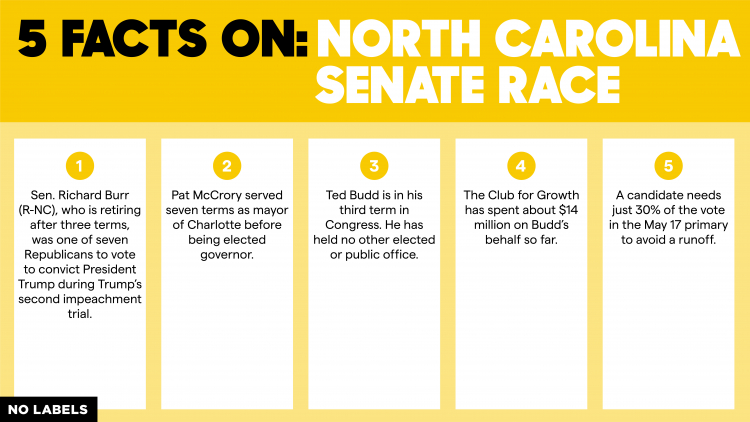Five Facts on the North Carolina Senate Race

The Big Insight: Extraordinary massive spending in the millions of dollars by the Trump-aligned interest group Club for Growth represents an unprecedented attempt to basically buy a North Carolina Senate seat for a candidate who is patently underqualified.
Club for Growth Action, the political spending arm of the conservative group Club for Growth, has poured millions of dollars into the North Carolina Senate race. Its negative ads attacking former Gov. Pat McCrory, the former frontrunner, have pushed Rep. Ted Budd into the lead in the May 17 primary race. The key questions of why the Club for Growth is doing this and who is funding their efforts both remain unanswered.

Here are five facts on the North Carolina Senate race.
1. Sen. Richard Burr (R-NC), who is retiring after three terms, was one of seven Republicans to vote to convict President Trump during Trump’s second impeachment trial.
North Carolina’s Senate seat is open due to Burr’s retirement. In addition to voting for Trump’s conviction, he struck a bipartisan course in recent years by supporting the $900 billion December 2020 COVID package and the Infrastructure Investment and Jobs Act.
There are three major contenders in the Republican primary race: McCrory, Budd, and ex-Rep. Mark Walker. Democrats have unified behind former state Supreme Court Chief Justice Cheri Beasley.
2. Pat McCrory served seven terms as mayor of Charlotte before being elected governor.
McCrory became the youngest mayor of North Carolina’s largest city at age 39 and went on to serve for 14 years, the longest-ever tenure for a Charlotte mayor. He established a 25-year transportation and land-use plan that included a light rail system, and brought the NASCAR Hall of Fame to the city, beating out other contenders including Atlanta.
When McCrory became governor in 2013, North Carolina had the nation’s fourth-highest unemployment rate and a state budget deficit. By the end of McCrory’s tenure, which included reductions in both personal and business income taxes, the state had a $450 million budget surplus, and the state’s unemployment rate was less than five percent, compared to 10.7% when he took office.
3. Ted Budd is in his third term in Congress. He has held no other elected or public office.
Budd, a gun shop owner, won a 17-way primary in North Carolina’s 13th District in 2016 with just 20% of the vote. He was boosted by $500,000 spent on his behalf by Club for Growth Action in a primary in which fewer than 32,000 people voted. Although the media has never reported why the group has been such an enthusiastic supporter of Budd, there is speculation in North Carolina political circles that his family’s vast wealth is a factor. Budd’s father founded The Budd Group, a facility service company with revenues topping $134 million per year. The Budd Group received a $10 million Paycheck Protection Program loan in 2020.
In the House, Budd became a member of the Freedom Caucus and objected to the certification of electoral votes from the 2020 presidential election. Budd, who won an endorsement from Donald Trump that surprised many Trump loyalists, has refused to debate his primary rivals.
The Club was initially anti-Trump, spending heavily against him early in the 2016 campaign. But the Club has shifted into an alliance with Trump, backing many of the far-right candidates he supports, uniting the former president, the deep-pocked organization, and the House Freedom Caucus into a force driving the GOP to the extremes.
4. The Club for Growth has spent about $14 million on Budd’s behalf so far.
That’s compared to the $8.1 million the four leading candidates themselves raised in all of 2021. Budd and McCrory are closely matched in direct fundraising, but spending from outside groups opposing McCrory have exceeded spending from those backing him by nearly 80 to one.
Club for Growth Action is spending more on the North Carolina Senate race than on any other election in the country.
5. A candidate needs just 30% of the vote in the May 17 primary to avoid a runoff.
While several states have runoff thresholds in primaries, North Carolina is the only state where the threshold is just 30%. If any candidate exceeds that level, there will be no runoff, and if more than one candidate tops 30%, the candidate with the most votes becomes the nominee. Recent polls show Budd at about 34%, followed by McCrory at 22% and Walker at about eight percent. McCrory led the polls before the Club for Growth spending began.
No Labels is an organization of Democrats, Republicans, and independents working to bring American leaders together to solve problems.





